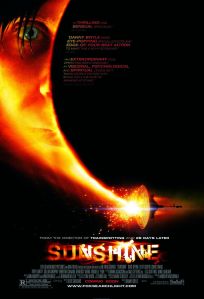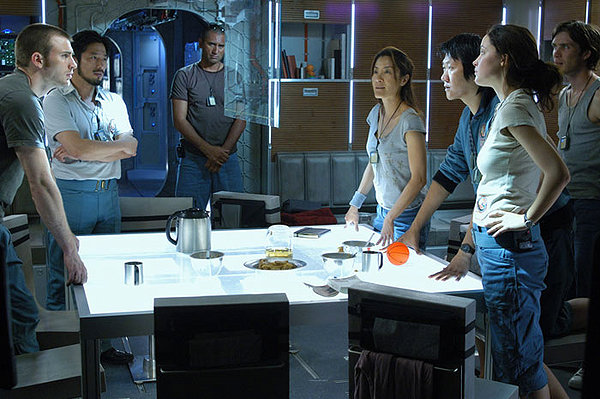Release Date: April 5th, 2007 (UK); July 20th, 2007 (US limited)
Genre: Adventure; Science-fiction; Thriller
Starring: Cillian Murphy, Rose Bryne, Chris Evans, Michelle Yeoh
Quite appropriately, Sunshine spends a significant amount of time focusing on the eyes of its pawns. Sometimes a pair will fill the entire screen, strained with sentiment either good or bad, though often the latter. On occasion, they will fight menacingly through an iffy transmission from another spacecraft and act as a warning. The Sun allures them with its fiery aesthetic and unwavering appeal. Without hesitation, characters ask, “What do you see?” in moments of impending demise as if nothing else matters in the universe. Look, even, at the poster. Yielding a blazing visual palette and dreamt up by the mind’s eye of screenwriter Alex Garland, the film is a sci-fi celebration, though you won’t see much celebrating. Riddled with mystery and psychological incoherence, Danny Boyle’s Sunshine floats very close to the sublime.
It is 2057 and an ominous solar winter has a stranglehold on Earth. Aboard Icarus II, a team of eight personnel are voyaging to the dying Sun with one aim: to reignite it. Carrying a nuclear payload, the crew only have one chance to hit their target and, given the operation’s purely theoretical prerogative, those odds aren’t as robust as the situation warrants. Upon discovering the location of Icarus I — a prior failed mission — physicist Capa (Cillian Murphy) recommends taking a detour in order to attain another bomb, and another attempt.
Though his portfolio doesn’t suggest much science-fiction enthusiasm, Danny Boyle’s admiration for the genre fireballs from the screen here. There are elements of seminal space cinema splashed all over Sunshine. From the vision of 2001: A Space Odyssey, to the fraught psychology depicted in Solaris, to Event Horizon’s incessantly doomed outlook, Boyle’s take on sci-fi pays homage to a plethora of greats. But it does more than that. This isn’t simply a historical Pick ‘n’ Mix of stars and planets, rather it incorporates the genre’s best components with subtlety and proceeds to tell a new story. We do not witness Capa and company enter a separate desolate spacecraft and subsequently become overwhelmed by thoughts of Event Horizon because Boyle does not allow it. The Brit always has control and his film always has us transfixed, not by inter-genre nods, but by an ever-enveloping tension and disconcerting mystique — in truth, the film refrains from sparing us any time to consider references until long after the credits have rolled (I’m recounting citations right now).
The director employs traits familiar to him, such as gritty realism and terminal dejection, and combines them with far more expansive notions that pit science against religion. In between philosophical conversations (“A new star born out of a dying one, I think it will be beautiful — no, I’m not scared”) crew members discuss the practicalities of their predicament: oxygen supply levels, or the Sun’s angle. Astronauts aside, we cannot relate to the quandary in which those aboard Icarus II find themselves, but we can ascribe to the pragmatic mindset that they often reverberate. The characters are normal people. Yes, they are each excessively intelligent and well-versed in specialist areas. But despite floating many miles above in space, they remain grounded — we have to take each individual at face value as none of their past lives are explained. You can forget surnames too: Cassie, Harvey and Mace will do just fine. These are ordinary people in an extraordinary circumstance, decision-making dictated by scenario and each individual just as vulnerable as any of us would be.
The characters’ incomplete personal logs contribute to another of the film’s successful narrative strands: a growing sense of tension. This is not a horror film yet it bears a variety of horrifying aspects, one of which is personnel ambiguity. Since we only know that which is in front of our eyes and nothing more, it is plausible to us that any member of the team could snap at any given moment. Boyle explores isolation and the subsequent psychological trauma faced by those disconnected from civilisation, a concept captured magnanimously by one character’s reaction to the decimation of a homely, naturalistic oxygen garden. As Icarus II advances closer to its destination (“Entering the dead zone”) a haunting strain is emitted, one that is eerie and difficult to pinpoint. Searle, the vessel’s doctor, becomes increasingly transfixed by the Sun which appears to be hauling the spacecraft ever-nearer to imminent death.
A slight tonal shift occurs in tandem alongside the crew’s interactions with the ill-fated Icarus I. From a tantalising slow-burner, proceedings deviate towards disorientating terror. The final act is probably the film’s weakest, but it is by no means a weak offering. If anything, the conclusion ushers in greater mythological tendencies spearheaded by religious impetus (in Greek mythology, Icarus flew too close to the Sun). Perhaps it is only fitting that a narrative adjacent to the heavens should juggle Godly morals. Nevertheless Boyle, a man with religious associations himself, ensures that Sunshine does not become overburdened by spirituality and instead strikes a wholesome balance between the film’s various thematic veins.
A scorching visual gloss is as all-encompassing as it is magnificent. The dark and inherently inanimate interior of Icarus II seems to not only seep from the crew’s mellow demeanour, but also abets an air of warped uncertainty. Battling to infect the spacecraft’s overcast insides is the Sun; rays burning with unlimited effervescence, so much so that you will be rolling up those sleeves in a desperate plea for cool air. Accompanying the wonderful cinematography is John Murphy’s tender-yet-lofty score that shines brightest towards the Sunshine’s concluding chapter.
Cillian Murphy leads the way as Capa, whose contemplative nature suggests that only he is truly aware of the task’s magnitude. The skill here is in generating a sense of normality and the best plaudit that can be awarded to Murphy — a generally charming presence — is that he emphatically portrays a professional physicist. Capa may partake in a few scuffles with Chris Evans’ Mace, but other than that he is plainly a physicist driven by nuclear properties and measurements. The aforementioned Chris Evans does well in a slightly different role as the morally strict engineer whose sole focus is the success of the mission. The other noteworthy performance comes from Rose Byrne as vessel pilot Cassie. Bryne develops a solid equilibrium between strong-willed and sensitive, and also strikes up a believable dynamic with Murphy, one that would undoubtedly be romantic in another environment.
Capa’s opening monologue outlines one purpose: “To create a star within a star.” Boasting admirable scope, a tense and engaging atmosphere, and a variety of well-oiled thematic roots relevant to the genre, Sunshine is undoubtedly a star turn from Danny Boyle.
Images credit: IMP Awards, Rotten Tomatoes
Images copyright (©): Fox Searchlight Pictures


Tossing science and plausibility to the side, this film is what science fiction is and should be! One of my all time favourite films! The soundtrack, performances, imagery, story, everything just fits together perfectly! Sublime post, my friend :).
Completely agree mate, it’s a magnificent piece of work from Danny Boyle. Also rather underrated in the sense that you don’t often hear people talking about it within the context of great sci-fi films.- it only received a limited release in the States! Thanks Joseph, appreciate it!
Great work. Definitely Boyle’s most under-appreciated film. I loved it, right until the end which went all Event Horizon and lost it’s way somewhat.
I do think the final third struggles a tad in comparison to the preceding two, but by the time it arrives I’m willing to bask in just about anything Boyle wants to show! Thanks for stopping by mate.
The switch in tone that occurs in the middle really threw me for a loop. I’m still trying to figure out whether or not it was a good loop, or a bad one, but it’s an interesting that Danny Boyle has definitely made a career of doing for the longest time. Good review.
It’s a good loop Dan! Haha. Boyle’s films always have something new and engaging on offer. Thanks mate!